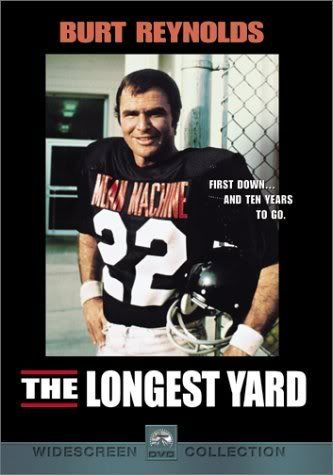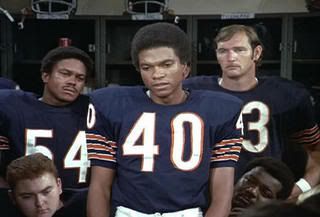
When football had a brain - and a sense of humor!
(The Longest Yard, 1974)
I have been an avid fan of the National Football League since I watched my first game on the television we had just bought in 1954. The team I watched that day was the San Francisco 49ers, and I’ve been a 49ers fan ever since. So was everyone else in my hometown, 150 miles north of San Francisco.
Over the years the players have become more athletic - better, stronger, faster - and bigger, much bigger. Sort of like Steve Austin, the $6,000,000 man, only more expensive and bigger, but dumb and dumber. A perfect example, Terrell Owens.
Unlike the professional athletes of the 1950’s, today’s athletes are paid so much that they can concentrate on football year round, and never have to work a day after they retire assuming they get professional investment advice and follow it. The ambitious ones devote most of their off-season to working out to maintain or improve their physical conditioning.
Even the star players of the 1950’s had regular jobs in the off season, and had to have an occupation to support themselves and their families after their playing days were done. While playing, they would spend half the year working at a regular job, then struggle to get back into playing shape for the football season.
Therefore, I am amazed by how much more knowledgeable the players fifty years ago were about how to play the mental part of the game. (Maybe it was because they paid more attention then to playing the game, and less to choreographing their celebrations a la Terrell Owens)
Mental part?
Yes, football has a very important mental element, and most close games are won or lost because of it. During my very enjoyable and remarkably undistinguished playing days as a Point Arena High School Pirate, 1956 -1960), I remember Coach Snow frequently yelling at us and pointing at his head when we didn’t use ours in practice. He wanted us to always be aware of the down and distance before every play, and know what we should do because of it and the game situation.
The Chargers lost today because they lost awareness on a fourth down Patriot pass play.
The game I watched today between the San Diego Chargers and the New England Patriots was a classic example of the very ragged football you see today, and neither team seemed particularly capable of challenging for a Super Bowl. The Patriot’s quarterback, Tom Brady, frequently mentioned in the same breath as Joe Montana, didn’t look the part of a three-time Super Bowl winner. (However, please see my update and apology to Tom Brady at the bottom of this post)
The San Diego Chargers seemed to be far superior physically. During the early part of the game I thought that the Chargers would really have to mess up to lose the game. As the game progressed it became obvious that they were capable, even more than willing, to do just that.
The mental element, or the lack of it, seems to be a characteristic of teams coached by Marty Schottenheimer, who has now only won 5 of 18 playoff games, including losing the last six. The Chargers totally dominated the Patriots for all but the last two minutes of the first half, at which point they decided to play it safe and, as is usual when teams decide to play it safe, gave up an easy touchdown to the Patriots. Chargers 14, Patriots 10 at halftime.
The mental lapses of the first half were only a prelude to the collapse in the second. The Chargers had the Patriots stopped and would have forced a punt, but their hot-headed right corner back, Florence, just had to deliver a head butt right in front of the officials after the play was over, which gave the Patriots a first down and great field position. Later, the Charger punt returner, Parker, tried to pick up a punt he muffed instead of falling on it, and the Patriots recovered it in Charger territory and eventually kicked a field goal.
Later, when the Chargers scored a touchdown that seemed to put the game out of reach, their right tackle Olivea committed a personal foul after the point-after-touchdown and the Chargers had to kick off from their 20 yard-line, again giving the Patriots good field position.
At about this time I was exasperated at how poorly both teams were playing. Tom Brady had already been intercepted twice on very poorly thrown balls, and both quarterbacks would have suffered even more interceptions except their teams’ defensive backs seemed to have their hands encased in iron.
Fortunately for Brady, and unfortunately for the Chargers, the Charger free safety Marlon McCree got over his case of “iron hands” at precisely the wrong time. On fourth down, Brady threw a desperation pass right at McCree.
As an aside, when I played high school football we were taught to yell at each other, “If it’s a pass, knock it down!”, whenever the opposing team was about to run a fourth-down play. Our coach knew, and taught us painstakingly, that if we just knocked the ball down we would take possession at the original line of scrimmage. If we intercepted the pass, we probably wouldn’t be able to run it back as far as the original line of scrimmage, so we would be better off just knocking it down.
McCree, a highly trained (and highly paid) football professional, didn’t knock the pass down. He intercepted it, and then fumbled the ball back to the Patriots. Of all the things that could have happened on the play, McCree did the only thing that could set up the Patriots to win. Had McCree knocked the ball down, the Chargers would have gotten the ball at almost mid-field still leading by eight points.
If all they did was hand off to LaDainian Tomlinson, and then punt or eventually kick a field goal, they probably would have sewed up the victory. But McCree made all of this academic. He gave the ball back to the Patriots with four new downs and great field position just because he didn’t learn the basics we learned playing eight-man high school football fifty years ago.
He'll probably want a big raise on his next contract because of his interceptions.
Years from now he’ll brag to his grandchildren, "Your granddaddy intercepted Hall of Fame quarterback Tom Brady in an AFC playoff game."
UPDATE, and a sincere apology to Tom Brady:
After a night of sound sleep and a morning of reflection, I realize how totally I erred in my disparaging comments about Tom Brady. Tom Brady was flaming brilliant!
As a Bloke might say.
As Tom Brady dropped back to pass, fourth down and five yards to go for a first, trailing by eight points, over half way through the fourth quarter, the situation looked hopeless for the Patriots. His deep receivers were well covered, and a completion to one of them was highly unlikely. The most probable outcome of a deep pass was an incompletion, and the Chargers would get the ball with good field position and just run out the clock with LaDainian Tomlinson.
A short pass would have been easy to complete, but the Charger linebackers had dropped deep enough to be able to tackle the receiver before he made first-down yardage. The Chargers would take over at the spot of the tackle.
At this point Tom Brady’s brilliance took charge. “If I throw an easy interception, what could happen? If I make it easy enough, the defensive back will be able to catch it instead of dropping it or knocking it down like any smart, well-trained defensive player would. Since these guys were coached by Marty, I just know they’ll do the dumbest thing and catch it.
“Then what happens? Anyone dumb enough to intercept it would be dumb enough to try to make a big play instead of just falling down and covering the ball. Then it’ll be easy to strip the ball, and recover the fumble. We get a first down at the spot of the fumble recovery, even if it’s not far enough downfield to get a first down if a Patriot receiver caught it.
“Here McCree, don’t drop it for God's sake!”
As a bonus, Marty wasted a timeout by requesting a useless instant replay review. That timeout would have been invaluable on the last drive to tie the game with a field goal.
Other interesting blogger comments.

Gale Sayers: Locker-room Address to Players on Brian Piccolo's Cancer, from "Brian's Song" - 1971
(When football had a heart) Click on this link, then click on the MP3 player to hear Billy Dee Williams as Gale Sayers ask his teammates to dedicate the game ball to Brian Piccolo. Don't let anyone see you, and have some kleenex handy.
Please click on the label below to see all my articles on this topic.
No comments:
Post a Comment